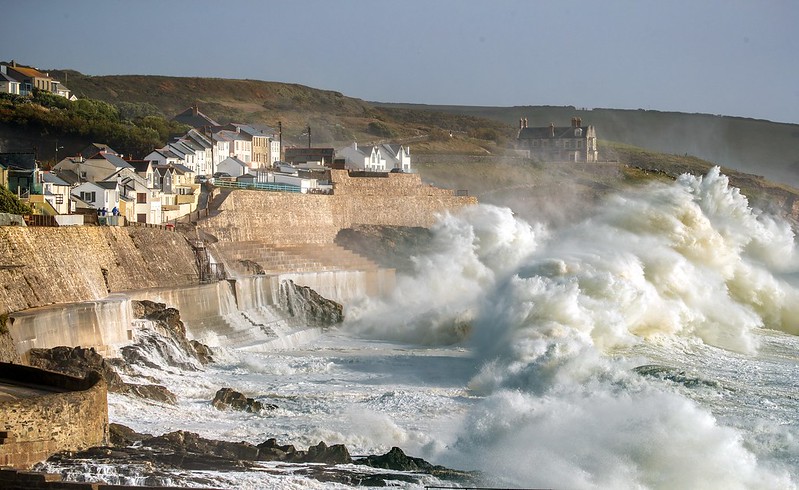Cutting greenhouse gas emissions will save significant damage to the UK economy

Climate change could cause significant economic damage to the UK by the end of this century unless there are stronger reductions in global greenhouse gas emissions, according to a new report.
A team of researchers in the UK and United States analysed a range of previous studies to estimate the likely consequences of climate change from 'catastrophic disruption to the global economic system' and direct effects across nine 'impact channels', including agriculture, livestock and fisheries, drought, flooding and coastal damage.
Priestley Centre researcher Dr Chris Smith was part of the international team led by the Grantham Research Institute on Climate Change and the Environment at the London School of Economics and Political Science.
The researchers assumed that current climate policies worldwide would lead to a global temperature that is 3.9°C higher than its pre-industrial level by 2100. Total climate change costs were found to increase from the equivalent of 1.1% of UK gross domestic product (GDP) at present, to 3.3% by 2050, and 7.4% by 2100.
Cutting global emissions to net zero by 2075 would limit warming to 2.1°C by 2100 compared with pre-industrial level, and would slash the costs the damage to the UK from climate impacts to the equivalent of 2.4% of GDP, a decrease of 5.0 percentage points compared with climate change losses to the UK economy resulting from current policies worldwide.
Dr Chris Smith said: "This report clearly re-confirms that ambitious emissions reductions and achieving net zero is not just necessary for our health, but also makes financial sense. Mitigating climate change is less costly than dealing with its effects.
"We also see that climate impacts are not distributed evenly across the UK, with the greatest damages likely from sea-level rise and storm surges in vulnerable coastal areas. Smart adaptation must also be part of the plan to deal with the likely effects of climate change in the UK."
The researchers found that achieving the UK’s net zero target would provide added benefits to the UK beyond avoided climate impacts that would be equivalent to an increase of 3.3% in GDP. They would also provide a further boost of 2.8% to the UK’s economy by stimulating investment in green industries and infrastructure.
Altogether, a scenario in which the UK reaches net zero emissions by 2050, and the world as a whole achieves the same target by 2075, would result in net economic benefits to the UK economy by the end of the century that would be equivalent to an increase in GDP of 9.1%.
Dr James Rising, who led the analysis at the University of Delaware, said: “These estimates provide both a stark warning of the future economic damage to the UK resulting from a lack of climate action, and a comparison between the costs of climate change impacts and the costs of reducing emissions.”
“We estimate that the mitigation costs involved in the UK’s pathway to net zero by 2050 are unlikely to exceed the equivalent of 2% of GDP over the transition period. Furthermore, climate mitigation policies bring additional benefits, for example by improving health and invigorating of the economy through investment, equivalent to an increase of 6.1% in GDP by the end of this century.”
The researchers found that the largest economic risk under current policies is from 'catastrophic disruption to the global economic system', which could cause losses to the UK by 2100 equivalent to 4.1% of GDP by 2100.
Disruption to foreign trade as countries elsewhere in the world experience losses from climate change would cause additional damage to the UK equivalent to 1.1% of GDP.
The researchers also concluded that the health benefits from less extreme winters in the North of the UK will be overshadowed by heat impacts across the country, increasing the death rate by 7.1 deaths per 100,000 people by 2100 under current policies, equivalent to a 0.4% reduction in GDP.
However, cutting emissions strongly would reduce the rate of heat-related deaths to 0.9 per 100,000 people, equivalent to a 0.05% increase in GDP.
The analysis also revealed that the weakening of the Gulf Stream in the North Atlantic due to climate change could devastate UK agriculture (which currently generates 0.6% of UK GDP), resulting in a loss equivalent to 0.25% of GDP under current policies. However, strongly cutting emissions would reduce the losses to the equivalent of just 0.02% of GDP.
Access the full report: 'What will climate change cost the UK? A study of climate risks, impacts and mitigation for the net-zero transition'
Image: "PORTHLEVEN STORM" by Tony Armstrong-Sly is licensed under CC BY-ND 2.0.
